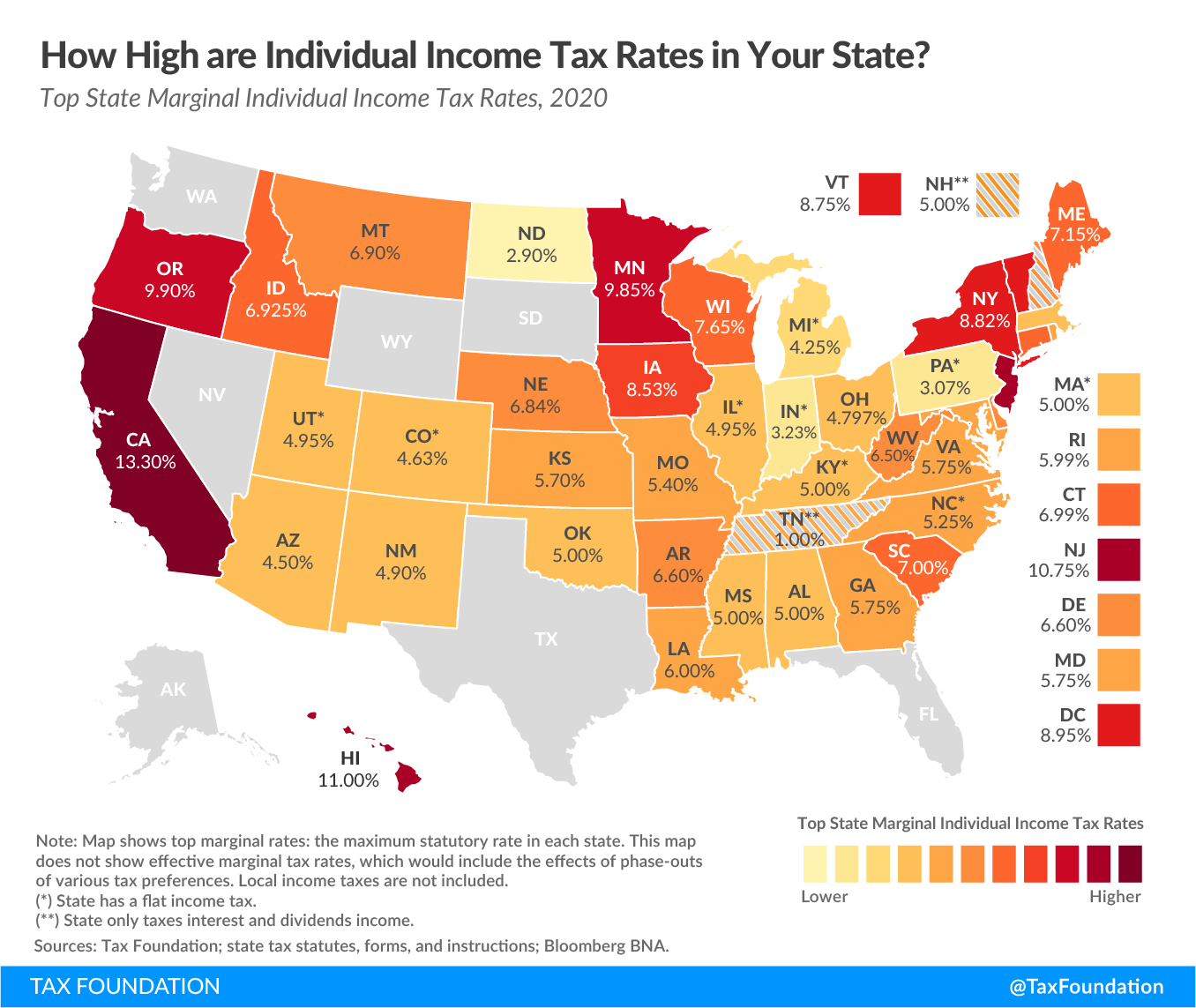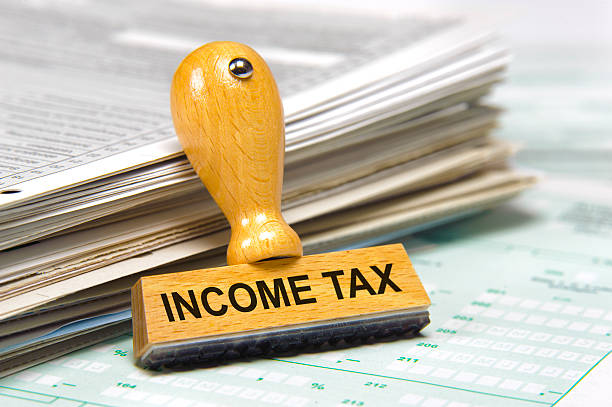Navigating the Tax Landscape: A Comprehensive Guide to States with No Income Tax
Related Articles: Navigating the Tax Landscape: A Comprehensive Guide to States with No Income Tax
Introduction
With enthusiasm, let’s navigate through the intriguing topic related to Navigating the Tax Landscape: A Comprehensive Guide to States with No Income Tax. Let’s weave interesting information and offer fresh perspectives to the readers.
Table of Content
Navigating the Tax Landscape: A Comprehensive Guide to States with No Income Tax

The concept of a state income tax can be a significant factor when considering relocation or investment opportunities. For individuals and businesses seeking lower tax burdens, understanding which states do not levy an income tax is crucial. This comprehensive guide provides a detailed overview of states without an income tax, outlining their key characteristics, economic landscapes, and considerations for those seeking tax-friendly environments.
A Map of Tax-Free Territories: Understanding the Landscape
Currently, nine states in the United States do not impose an income tax: Alaska, Florida, Nevada, South Dakota, Tennessee, Texas, Wyoming, Washington, and New Hampshire. While these states share the commonality of no income tax, they differ significantly in their overall tax structures, cost of living, and economic opportunities.
A Closer Look at the Nine Income Tax-Free States
1. Alaska: Known for its stunning natural beauty and abundant resources, Alaska stands out with its unique Permanent Fund Dividend (PFD) program. This program distributes a portion of the state’s oil revenue directly to Alaska residents. While Alaska has no income tax, it levies a 5% sales tax and a variety of other taxes, including property taxes and a motor vehicle excise tax.
2. Florida: A popular retirement destination and a hub for tourism, Florida boasts a robust economy and a diverse population. With no income tax, Florida attracts individuals and businesses seeking a lower tax burden. However, Florida has a 6% sales tax and a variety of other taxes, including property taxes and intangible taxes.
3. Nevada: Known as the "Silver State," Nevada is a popular destination for gambling, entertainment, and tourism. Nevada’s lack of income tax, coupled with its low business regulations, attracts entrepreneurs and businesses. However, Nevada levies a 6.85% sales tax and a variety of other taxes, including property taxes and a motor vehicle excise tax.
4. South Dakota: South Dakota’s lack of income tax has helped attract businesses and individuals seeking a more favorable tax environment. The state’s economy is driven by agriculture, tourism, and manufacturing. South Dakota does impose a 4.5% sales tax and a variety of other taxes, including property taxes and a motor vehicle excise tax.
5. Tennessee: Tennessee’s "no income tax" policy has been a major driver of economic growth, attracting businesses and individuals seeking lower taxes. The state’s economy is driven by manufacturing, tourism, and healthcare. Tennessee levies a 7% sales tax and a variety of other taxes, including property taxes and a motor vehicle excise tax.
6. Texas: Known as the "Lone Star State," Texas has a strong economy driven by energy, agriculture, and technology. Texas’s lack of an income tax is a significant factor in attracting businesses and individuals seeking a more favorable tax environment. Texas levies a 6.25% sales tax and a variety of other taxes, including property taxes and a motor vehicle excise tax.
7. Wyoming: A sparsely populated state with vast natural resources, Wyoming has a low cost of living and a favorable business environment. The state’s lack of income tax is a significant factor in attracting businesses and individuals seeking a more favorable tax environment. Wyoming levies a 4% sales tax and a variety of other taxes, including property taxes and a motor vehicle excise tax.
8. Washington: Washington is a state with a diverse economy, driven by technology, aerospace, and tourism. While Washington has no income tax, it levies a 6.5% sales tax and a variety of other taxes, including property taxes and a motor vehicle excise tax.
9. New Hampshire: New Hampshire is a state with a strong economy, driven by tourism, healthcare, and technology. While New Hampshire does not impose an income tax on wages and salaries, it does levy an income tax on interest and dividends. New Hampshire also levies a 5% sales tax and a variety of other taxes, including property taxes and a motor vehicle excise tax.
The Importance of Understanding the Full Tax Picture
While these nine states offer the benefit of no income tax, it is crucial to understand that other taxes may apply. Each state has its own unique tax structure, including sales tax, property tax, and other excise taxes.
Considerations for Individuals and Businesses
For Individuals:
- Cost of Living: The cost of living can vary significantly across these states. While some may offer lower housing costs, others may have higher costs for utilities or healthcare.
- Retirement: Many of these states offer favorable tax benefits for retirees.
- Education: The quality of education varies by state. Some states offer strong public education systems, while others rely heavily on private schools.
- Healthcare: Access to affordable healthcare can be a significant factor in choosing a state.
For Businesses:
- Business Regulations: Some states have more business-friendly regulations than others.
- Labor Market: The availability of skilled labor can be a crucial factor for businesses.
- Infrastructure: Access to transportation, communication, and other essential infrastructure is essential for business success.
- Tax Incentives: Some states offer tax incentives to attract businesses.
Frequently Asked Questions (FAQs)
1. Do states with no income tax have higher property taxes?
There is no direct correlation between the absence of an income tax and higher property taxes. Property tax rates vary significantly based on local government budgets, property values, and other factors.
2. Are states with no income tax always better for businesses?
While the absence of an income tax can be advantageous, businesses should consider other factors, such as the overall tax structure, business regulations, and the availability of skilled labor.
3. Can I move to a state with no income tax to avoid paying federal income tax?
Federal income tax is a separate tax obligation, and it is not affected by the absence of a state income tax.
4. Do states with no income tax have lower sales taxes?
Sales tax rates vary significantly across states. While some states with no income tax may have lower sales tax rates, others may have higher rates.
5. Are states with no income tax always better for retirees?
While the absence of an income tax can be beneficial for retirees, other factors, such as healthcare costs, property taxes, and the availability of amenities, should also be considered.
Tips for Choosing a State with No Income Tax
- Conduct Thorough Research: Research the overall tax structure, cost of living, and economic opportunities in each state.
- Consult with a Tax Professional: A tax professional can help you understand the implications of moving to a state with no income tax.
- Consider Your Individual Needs and Circumstances: Factors such as your income level, family size, and career goals should be considered when choosing a state.
Conclusion
States with no income tax offer a unique opportunity for individuals and businesses seeking a more favorable tax environment. However, it is essential to understand the full tax picture, including sales tax, property tax, and other excise taxes. By carefully considering all relevant factors, individuals and businesses can make informed decisions about relocating or investing in these tax-friendly states.

:max_bytes(150000):strip_icc()/9StatesWithoutAnIncomeTax-8930504a78a94618b205ffd70dc03928.png)






Closure
Thus, we hope this article has provided valuable insights into Navigating the Tax Landscape: A Comprehensive Guide to States with No Income Tax. We hope you find this article informative and beneficial. See you in our next article!